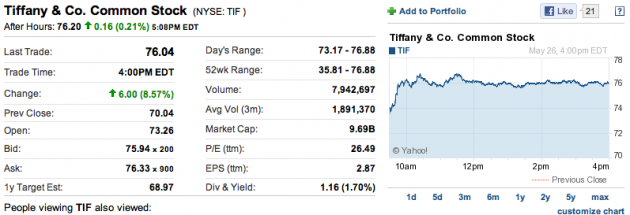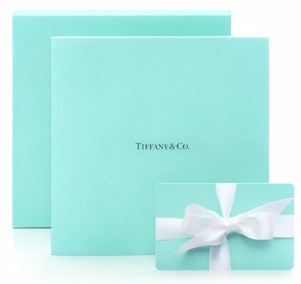The Valuation on Tiffany & Company Common Stock Continues to Perplex Me
I am working from the office today – the first time in nearly six weeks I’ve actually shown up since I’ve been in New York and before that preferred to work from my home study or from other locations – and happened to be going through the news stories when I see the big controversy regarding Newt Gingrich (which I think is ridiculous – I don’t want the man in the White House but this whole outrage over his line of credit at the jeweler is absurd). That, of course, led to me being me and I pulled the Tiffany & Company stock quote up as of the closing of The New York Stock Exchange this afternoon. The last time we bought any Tiffany & Company was when I had one of the operating businesses purchase a single share to be framed for the office wall years ago so I was curious.

What are people thinking?! The company is currently trading at an earnings yield of 3.775%. If you were holding these shares through a brokerage account and the firm paid out all earnings as dividends, you would have to give up 15% to the IRS (let’s assume you live in a tax-free state like Texas), which would cut the earnings yield even further to 3.21%.
Don’t get me wrong – I love Tiffany & Company. It is a great business with huge brand equity. In fact, I am thinking about buying a set of sterling silver flatware as my Christmas-gift-to-self this year (the English King pattern, if you’re interested). But the government continues to run deficits that, at some point, are almost certainly going to have to lead to a long-term inflation rate comparable to that which we experienced between 1900 and 2000 (4% for those who aren’t versed in financial history). This would indicate that someone buying part ownership in Tiffany & Company today is getting a net look-through return of less than the rate of inflation, meaning all actual gain in intrinsic value is going to have to come from earnings growth.
 To earn a decent return – 7% to 10% – you have the believe earnings are going to increase at that rate for the foreseeable future. I understand a good deal of Tiffany’s earnings come from overseas, especially Japan, so there could be a play against a weakening United States dollar. Plus, management has proven particularly adept at managing tax law and international capitalization structures so I think they are doing a good job. But this seems like an incredibly optimistic price for a business more than a century old. You’d have to believe that it was going to become the dominant retailer in China and India, as well, to justify it.
To earn a decent return – 7% to 10% – you have the believe earnings are going to increase at that rate for the foreseeable future. I understand a good deal of Tiffany’s earnings come from overseas, especially Japan, so there could be a play against a weakening United States dollar. Plus, management has proven particularly adept at managing tax law and international capitalization structures so I think they are doing a good job. But this seems like an incredibly optimistic price for a business more than a century old. You’d have to believe that it was going to become the dominant retailer in China and India, as well, to justify it.
I’m not saying it won’t happen. It might. I’m just pointing out that there is no margin for error at this price. The 10-year Treasury bond is yielding 3.06% right now, barely less than Tiffany & Company stock. That leaves no equity risk premium. My goal is to sleep well at night without worrying about money and this is not a price that would allow me to do that. How could someone commit to becoming an owner on these terms? I just don’t understand people sometimes.
(Theoretically, one could believe that earnings were going to double next year and then grow normally from there on out and the current valuation would be justified, too. There are a lot of ways to get there. I just think all of them require a lot to go right. If I were getting a sales pitch on the stock, I would want specifics as to how the earnings get from “A” to “B” over the next few years, especially in light of soaring inputs costs like gold and silver.) My biggest concern would be the following, as illustrated in a story published on Yahoo Finance after pointing out profits were up 25% for the quarter:
However, excluding the stronger yen, sales fell 3 percent. Still, that was better than Tiffany expected.
Revenue in stores open at least one year, a key industry metric, also fell 3 percent. Tiffany said all stores closed due to the earthquake have reopened.
The company expects, at best, $3.55 in per share earnings. That still only gets you to a 4.67% earnings yield, or 3.97% adjusted for the taxes that would be owed if all profits were distributed as dividends. Again, these folks are banking on significant earnings growth over the next 3-5 years. Short of the continuing destruction of the dollar, what is the catalyst? Where are those earnings originating?


